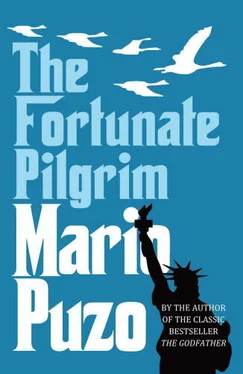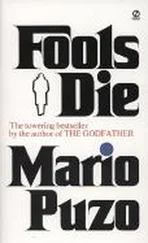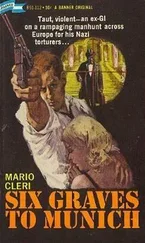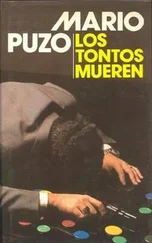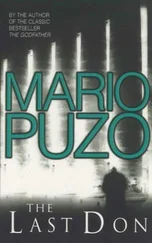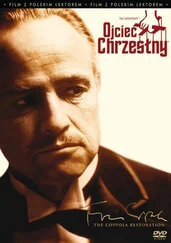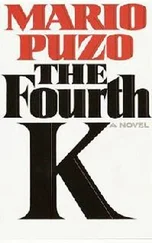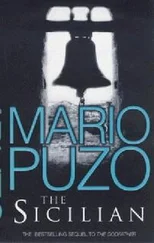Under the black awning they found Octavia waiting for them, shivering with cold. She asked shrilly, “Where did you two go? Mom is terribly nervous—she thinks Gino left.”
“Oh, Christ,” Larry said. “I’ll talk to Ma. You stay in the parlor, Gino.”
Gino felt the now-familiar physical fear and realized he must have looked frightened. Larry was protecting him. He was bewildered by the terror that swept over him.
In a few minutes Larry came back smiling and said, “Octavia just making a big deal out of nothing, like she always does. The old lady wants to make sure we’re here when they close up.”
People were filtering out. The undertaker appeared and, as a blood relative of death, he helped Larry and Gino speed the mourners on their way, until finally only those closest to the family remained. The huge funeral parlor empty, Gino could hear the chairs behind the small archway being scraped back as his mother and her friends prepared to leave the coffin. The long night was over. There was a strange silence in the other room, and Gino thought about walking home ahead of the others to avoid his mother. This one day he feared her as he had never feared anything in his life.
THE TERRIFYING SHRIEK caught Gino completely by surprise, freezing him with horror. It was followed by another scream that broke into a wail of anguish and his mother’s voice crying out, “Vincenzo, Vincenzo,” with such pitiful grief that Gino wanted to fly out the door and away where he could never hear her. The undertaker, perfectly calm, as if he had been waiting for just this, and as if he understood Gino’s thoughts, put a restraining hand on his shoulder.
Suddenly the archway was filled with black—four women coiling and twining around each other like snakes. Octavia, Louisa and Zia Teresina were trying to drag Lucia Santa through the archway, the struggle in terrible earnest.
They had tried words and caresses beside the coffin, but to no avail. They had tried to recall Lucia Santa to her duties as the mother of five other children, and she had dug her nails into her dead son’s coffin. Now the three women had no pity on her. They would not let her stay. They would not let her drive herself mad with grief. They were merciless. Octavia had one arm and shoulder. Louisa dragged on the other arm but with less force, so that Lucia Santa’s heavy body slewed around to one side. Zia Teresina clutched Lucia Santa cruelly by the neck and breasts and was dragging her forward along the mirror-black floor.
But the mother, like some stubborn animal, huddled up her heavy body in one resistant heap and could not be budged further. She did not protest. She did not wail again. Her black hat and veil fell sideways, raffishly, on her head. Her face was swollen, obstinate, and inhuman with almost bestial anguish. And yet she had never been more terrible, unconquerable, as if this world of death must smash into bits and vanish before her imperious grief.
The three women stood away from her. Louisa burst into tears. Octavia covered her face with her hands, then called out in a muted voice, “Larry, Gino, help us.”
They crossed the floor and stood with the women around the mother. Gino did not dare touch her. Lucia Santa raised her head. She spoke to Gino: “Don’t leave your brother alone,” she said. “Don’t let him stay by himself tonight. He was never brave. He was too good to be brave.”
Gino bowed his head in assent.
“You never obey me,” she said.
Gino said very low, “I’ll stay all night. I promise.” He forced himself to reach out and straighten her hat, very quickly, the first time in his life he had done such a thing for her. His mother reached up slowly to touch her veiled hat and took it off. She carried it in her hand as she walked to the door, as if she could not bear to shield her face, as if now, her head uncovered, she could face life again, its unreversible injustice, its inevitable defeat.
The undertaker offered to bring Gino a cot and apologized for having to lock the street door, showing Gino a bell he could ring in the registry if he wanted to get out. He himself slept in a room directly above. Gino kept nodding his head to show he understood until the man disappeared through an interior doorway.
Alone in the dark funeral parlor, knowing his dead brother’s coffined body hid just behind the small archway, Gino felt safe as he had not felt since before his brother died. He arranged wooden folding chairs in a row to serve as a couch and rolled up his coat for a pillow. Lying so, smoking, one arm against the cool wall, he tried to think of how his world had changed.
He thought of the things he had learned. Larry was really a gangster and people were afraid he would kill them. How dopey that was. Larry had never even punched his kid brothers. And Lefty Fay was a jerk saying Vinnie had walked into the engine—Vinnie was so timid he had stopped sitting on the window sill. And his mother crying and hollering and making all that trouble. Drowsily he let his mind tell what he truly felt, that her grief was excessive, that she made a ceremony of death. And then he remembered his own tears on the stoop. But he had been weeping for Vinnie as a small boy, when they had played together and sat on the star-bright window sill at night. Gradually it came to him that there was so little pity for the dead in grief. That it was a wailing for something lost, by only a very few, and so ceremony must be made of death, to hide what all must know to be true: that the death of a human being means so very little.
Poor Vinnie? Who grieved for him? He had become a whining, unhappy young man whom no one wanted to be with. Even his mother was sometimes impatient with him. She had wept for the many different little Vincents that had come before. As I did, Gino thought. I never cared for him after. Larry didn’t. Even Octavia didn’t really care. But Larry’s wife had cared, for some reason Louisa had cared. And old Zia Louche would have wept. Just before he fell asleep, Gino wanted to go through the archway and look at his brother’s dead face, to force himself to feel more pain, but he was too tired. His cigarette dropped to the glittering black floor, its tiny red ember like a coal in hell. Sleeping, he huddled on his row of chairs, cold against the paneled wall. He tried to struggle away from sleep, not knowing he had let out a cry that woke the undertaker in the room above.
It was not true. He had never killed his brother. He held his mother’s coat before her face, but his arms were so terribly tired. Her accusing eyes bore him back, and seeking some sort of mercy, he whispered, “I cried on the stoop down the street, see my face is still wet.” But his mother only sneered and said, “It’s just another one of your tricks. Animale—animale—animale— ”
And she was smiling at him. The dazzling smile of a young woman. Gino almost fell into the trap that would have destroyed them both. He almost spoke about the day he had stood in front of the tenement, waiting for her to bring his father home. But slyly, cunningly, he bowed his head. As she had not accused him in life, he would not accuse her in his dreams. Trembling, he promised to become another Vinnie, work in the railroad, marry, live in the tenements along the Avenue, wait at trolley stops with a child in his arms, chain himself in the known, lightless world he had been born in.
CHAPTER 23

THE OLD WOMEN of Tenth Avenue circled in the summer night and incanted the woes of the family Angeluzzi-Corbo.
At first they all cried out in sympathy, “Ah, what a terrible life! Poor Lucia Santa—her first husband dead, the second destroyed for life, and now a grown son, already a breadwinner, struck down. What tragedy, what misfortunes. Maledictions on God, His world, and all His mysterious saints and fates.”
Читать дальше
